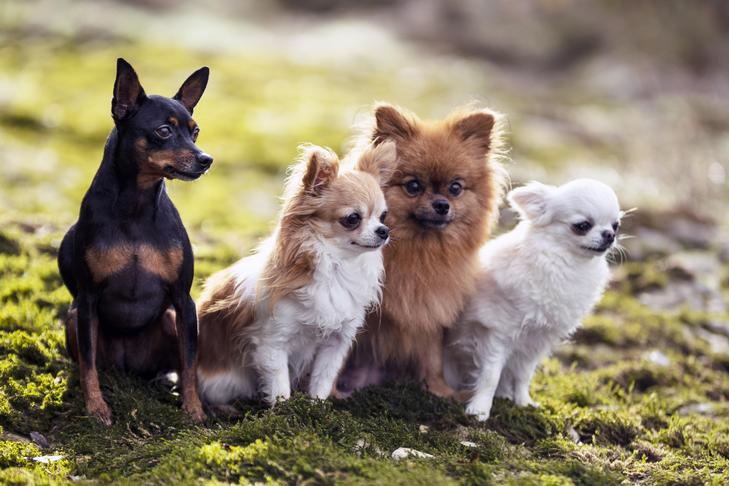Small dogs, often adored for their compact size and charming personalities, require special care and attention. While their needs may differ from those of larger breeds, ensuring their health and happiness is equally important. Here’s a comprehensive guide on How to Care for Your smallest dogs .
Understanding Small Dog Breeds
Small dog breeds, such as Chihuahuas, Pomeranians, and Dachshunds, typically weigh less than 20 pounds. They often have unique characteristics and needs, making it essential for owners to understand these aspects to provide the best care.
Nutrition and Feeding
- High-Quality Diet:
- Small dogs have fast metabolisms and may require more calories per pound than larger dogs. Choose a high-quality dog food specifically formulated for small breeds to meet their nutritional needs.
- Ensure the food is rich in protein and healthy fats to support their energy levels and overall health.
- Portion Control:
- Due to their small size, portion control is crucial to prevent obesity, a common issue in small dogs. Follow the feeding guidelines provided by the dog food manufacturer and consult your veterinarian for personalized advice.
- Frequent Meals:
- Small dogs may benefit from more frequent, smaller meals throughout the day to maintain their energy levels and prevent hypoglycemia (low blood sugar).
Exercise and Play
- Daily Exercise:
- Despite their size, small dogs need regular exercise to stay healthy and happy. Short walks, playtime in the yard, or interactive indoor games can provide the necessary physical activity.
- Mental Stimulation:
- Small dogs are often intelligent and curious. Engage them with puzzle toys, training sessions, and games that challenge their minds and keep them mentally stimulated.
- Safe Play Environment:
- Ensure the play environment is safe and secure, as small dogs can be more vulnerable to injuries and can easily slip through small openings or gaps.
Grooming and Hygiene
- Regular Grooming:
- Small dogs often have delicate skin and coats. Regular brushing helps keep their coat healthy and free from tangles and mats. The frequency of grooming depends on the breed and coat type.
- Bathing:
- Bathe your small dog as needed, typically once every few weeks or when they get dirty. Use a mild, dog-specific shampoo to avoid irritating their skin.
- Dental Care:
- Dental health is crucial for small dogs, as they are prone to dental issues. Brush their teeth regularly with dog-specific toothpaste and provide dental chews or toys to help keep their teeth clean.
- Nail Trimming:
- Keep your dog’s nails trimmed to prevent discomfort and potential injuries. If you’re unsure how to trim their nails, seek advice from a professional groomer or veterinarian.
Health and Wellness
- Regular Vet Check-Ups:
- Schedule regular veterinary check-ups to monitor your small dog’s health and catch any potential issues early. Annual vaccinations, parasite prevention, and dental exams are essential components of their care.
- Watch for Health Issues:
- Small dogs can be prone to specific health issues, such as patellar luxation, tracheal collapse, and dental problems. Be vigilant and consult your vet if you notice any unusual symptoms or behaviors.
- Weight Management:
- Obesity can lead to various health problems in small dogs. Monitor their weight and adjust their diet and exercise routine as needed to maintain a healthy weight.
Socialization and Training
- Early Socialization:
- Expose your small dog to different people, places, and other animals from a young age to help them develop into well-rounded, confident adults.
- Positive Reinforcement Training:
- Use positive reinforcement techniques, such as treats and praise, to train your small dog. Consistency and patience are key to successful training.
- Avoid Rough Play:
- Due to their small size, rough play can lead to injuries. Encourage gentle play and supervise interactions with larger dogs and children.
Comfort and Safety
- Comfortable Living Space:
- Provide a cozy, secure space for your small dog to rest and relax. A comfortable bed, blankets, and a designated safe area in your home can make them feel secure.
- Temperature Regulation:
- Small dogs can be sensitive to extreme temperatures. Keep them warm during cold weather with sweaters or coats, and ensure they stay cool and hydrated during hot weather.
- Safety Measures:
- Small dogs are more susceptible to accidents and injuries. Use a harness instead of a collar for walks, avoid leaving them unattended in high places, and ensure your home is dog-proofed.
Conclusion
Caring for your smallest dogs requires attention to detail, love, and dedication. By providing proper nutrition, regular exercise, grooming, and veterinary care, you can ensure your small dog leads a happy, healthy life. Remember, How to Care for Your smallest dogs is unique, so tailor your care routine to their specific needs and personality. With the right approach, your tiny companion will thrive and bring joy to your life for many years.

Leave a Reply